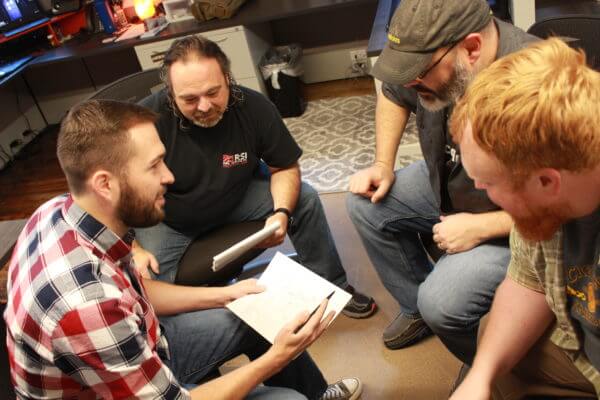“Change the experience” is one of Sparq’s core values and we’re constantly striving to do just that for our clients. From establishing our team-based account management process (TBAM) for optimal client communication, to our client-focused Innovation Framework, we know that when our clients succeed, we succeed. That’s why we recently doubled down on this crucial commitment. Scott Monnig, our former EVP of Professional Services, has been promoted to the newly created role of Chief Client Officer (CCO). Scott has proven his ability to navigate complex projects by building a foundation of trust with many of our largest clients. Scott’s organization helps us deliver with more intimacy and effective communication with our clients than can be provided by offshore or nearshore organizations.
Creating a great client experience has always been at the forefront of everything we do. So how do we do it? We start by engaging our entire organization. Our colleagues are co-located in our development centers across Middle America, and by doing this, we’re not just a collection of individuals, but a true team. We bring thoughtful engagement, innovative thinking, and strong delivery; concepts that we’ve learned from 13 years as a pioneer in this space. To us, changing the experience for our clients isn’t just a turn of phrase, it’s a commitment to providing the best and brightest ideas from the best and brightest people.
In today’s fast-moving tech world, our clients require a nimble, agile approach, coupled with the ability to be proactive and respond quickly. That’s why we rely on consistent and continuous collaboration with our clients and across our six development centers. This collaboration brings fresh ideas that not only move our clients’ business objectives forward, but also results in serious growth. In other words, we don’t just do what our clients ask us to do; we enact a proactive strategy from the beginning, so they feel supported, inspired, and ready to conquer their goals, knowing they’ve partnered with the right team.
It’s because of our talented team that we’ve been experiencing serious growth at Sparq. Colleagues here, including Scott, care deeply about our clients, and work diligently to help them succeed. With the creation of his new role, I’m confident that Scott will continue to drive our value of changing the experience for our clients, and our colleagues.

Snowflake Summit 2025 Announcements
Snowflake Summit 2025’s latest announcements made it clear: the path to genuine AI-driven impact hinges on frictionless access to data, the ability to act on it with clarity, and absolute confidence in its protection. Learn more about how they're making that happen for customers in this article.

How ChatPRD Helps Build Better Stories (and a Stronger Team)
When user stories are vague, it slows down delivery, trust, and momentum. This article by Senior Product Strategy Consultant Traci Metzger shows how she used a lightweight, AI-guided system (ChatPRD) to write clearer, developer-ready requirements that actually accelerated execution.

QA in the Age of AI: The Rise of AI-Powered Quality Intelligence
As organizations push code to production faster, respond rapidly to new customer needs and build adaptive systems, the expectations on quality have changed. It's no longer enough to simply catch bugs at the end of the cycle. We’re entering an era where quality engineering must evolve into quality intelligence and organizations adopting quality intelligence practices are reporting measurable gains across key delivery metrics. Learn more in this article by Principal Engineer Jarius Hayes.

Operational Efficiency in the AI Era: What Matters and What Works
Ever wonder how leading teams are cutting costs without cutting corners? Hint: it starts with AI. In this article by Principal Delivery Manager Kabir Chugh, learn how AI is powering smarter ops, faster deployments, and measurable savings across industries.
